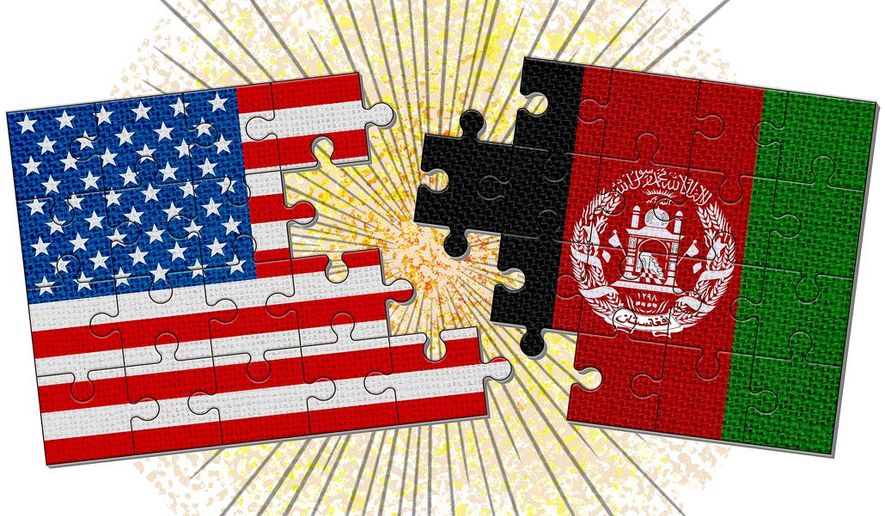OPINION:
In Afghanistan, America is stuck between a rock and a hard place. U.S. envoy Zalmay Khalilzad is currently on a 17-day world tour, trying to shore up support for peace talks with the Taliban. Despite all of the challenges of peace negotiations, he has inspired some hope that nearly four decades of fighting might actually end (Afghanistan has been embroiled in civil war since the Soviet occupation of the 1980s).
But Mr. Khalilzad is confronting an impossible situation: The Taliban and the Afghan government have a fundamental conflict of vision, and neither is truly interested in peace, which makes it hard to stay optimistic. In a world of nothing-but-bad options, the best option for the United States is to move ahead with a military withdrawal, as these talks could very well drag on for a long time with no substantive progress.
On one side is the Taliban insurgency, which has proven itself resilient enough to not lose this conflict, but it lacks the ability to win outright control of Afghanistan — as does the U.S.-backed government. So far, they have refused to negotiate at all with the Afghan government — they view it as a puppet regime and insist on talking only with the United States, the occupying power.
In May, the Afghan government had proposed a ceasefire during Ramadan, agreeing to release 175 Taliban prisoners in exchange for a temporary stop to the fighting. There was a short ceasefire to mark end of Ramadan in 2018, but the Taliban rejected the offer this time around. Their leader, Haibatullah Akhundzada, recently said that “[n]o one should expect us to pour cold water on the heated battlefronts of jihad or forget our 40-year sacrifices before reaching our objectives.”
The Taliban may be repressive zealots, but they’re not stupid; they know they have leverage. The Afghan security forces are weak and would crumble without outside support, and Taliban leaders know they’re dealing with an American administration that is weary of the United States’ involvement in their country. While Washington hasn’t committed to leaving yet, there is no political will to invest in the conflict beyond the current status quo, which has led the Taliban to step up their attacks. They hope to be able to just wait out an inevitable withdrawal.
The Afghan government, led by President Ashraf Ghani, is similarly not that interested in real peace, because Ghani’s priority is staying in power, and he needs the international donor community and the U.S. military to protect him to do so. He refused to step down from the presidency despite the fact that his term ended in May, and he plans to stay in the position until the scheduled presidential elections in September.
One of the proposals being offered in the U.S.-Taliban negotiations is the formation of an interim government, which Mr. Ghani staunchly opposes, as he hopes to win re-election for another five-year term. His political survival depends on failing to reach a deal with the insurgents, as an interim government would inevitably mean he is unable to remain in office.
Mr. Ghani’s success would further undermine the legitimacy of the Afghan government — and U.S. efforts in Afghanistan by extension — as there is evidence that his victory in the 2014 election was illegitimate, due to widespread voter fraud and corruption, heavily implying that he lacks a real constituency. If he were to win again in September, many of the same concerns will undoubtedly be raised by observers. The mere insistence on holding elections amidst an emboldened insurgency will also cause more strife, as the Taliban is sure to ramp up attacks to discourage would-be voters and candidates.
Meanwhile, the United States’ main demand of the Taliban is not allowing Afghanistan to become a safe haven for terrorists. We don’t need to take the Taliban’s word that they will not allow groups like al Qaeda to take up refuge, because we can handle our safety on our own. The United States has the ability to globally monitor and disrupt terrorist activity without a permanent military presence. And besides, American military power effectively deterred the Taliban from making that mistake in 2001, when it decimated its ranks after 9/11.
The initial U.S. invasion in 2001 was justified, to both destroy al Qaeda and to punish the Taliban. But it hasn’t accomplished much of enduring consequence since then, except overstretch our military and add to our nation’s growing debt. Now, America has a choice. It can either continue to languish in an ineffective occupation that bleeds the U.S. military and taxpayer, with no chance for additional gains for America, in the hopes that the Taliban and the Afghan government surprise us all and seek peace in a good-faith manner — or it can accept it’s done all it can and leave. As far as American interests are concerned, exit is clearly the best option. It’s past time Washington acknowledge that reality.
• Jerrod A. Laber is a fellow at Defense Priorities and a senior contributor for Young Voices.




Please read our comment policy before commenting.